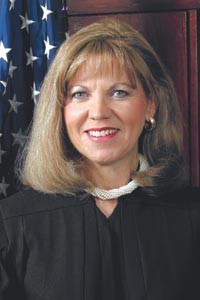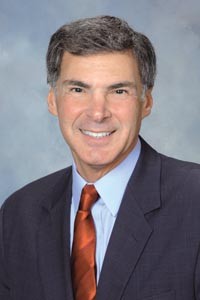On hot-button issues ranging from guns to gay rights, this year's Pennsylvania Supreme Court race may shape Pennsylvania's legal landscape for a generation. The outcome may literally reshape the state's political map.
But G. Terry Madonna, the much-quoted political scientist from Lancaster's Franklin and Marshall College, hasn't even bothered to do any polling on it. These obscure, off-year contests always suffer the same fate, he says: At least three-quarters of the electorate doesn't even know who the candidates are. And only hard-core "supervoters" will be drawn to the polls next month.
"Does anyone know these candidates?" asks Madonna. "The answer is no." And while the stakes are high, "If the voters don't know them, what is it about?"

The seven-member court currently has three Republicans, three Democrats and one vacancy -- left behind by the retirement of Chief Justice Ralph Cappy, and currently held by Jane Cutler Greenspan, who is filling out Cappy's term but agreed not to run. The winner of November's election, then, will tip the court's balance.
The candidates are Democrat Jack Panella of Northampton County and Republican Joan Orie Melvin. Both are sitting judges on the Superior Court, a lower statewide appeals court.
In Pittsburgh, Orie Melvin is better known than Panella. She was a judge in the Allegheny County Court of Common Pleas, and a chief magistrate in Pittsburgh's municipal courts. She and North Hills state Sen. Jane Orie are sisters.
Orie Melvin may also have the edge over Panella in terms of feistiness. She tried to refuse the infamous 2005 Harrisburg pay raise that fueled a minor voter revolt the next year -- and continues to return the additional salary.
Unlike other office-seekers, judicial candidates are generally barred from discussing their stances on specific issues. But among Orie Melvin's accomplishments, she says, has been creating a program to warn high school kids about unintended consequences of social networking and cell phones (such as when "sexting" leaves them open to child-pornography charges).
The judge has special reason to be wary of such technology: She spent five years pursuing her own lawsuit against the author of an anonymous political gossip Web site. The site alleged Orie Melvin tried to influence a political appointment, a charge she calls untrue and "defamatory."
She has also made a campaign issue of two Luzerne County judges now facing trial for allegedly sending kids to a private juvenile-detention facility in exchange for kickbacks. Panella, she notes, sat on the Judicial Conduct Board while the scandal was underway.
In response, Panella's campaign manager, Aren Platt, points to an Oct. 14 Harrisburg Commission on Juvenile Justice hearing. There, Luzerne's president judge argued that such crimes, if suspected by that ethics panel, would be referred to the FBI or attorney general anyway, so he decided to save time by going straight to the FBI himself.
For his part, Panella is emphasizing the importance of citizen access to the courts. While serving on the state's Commission for Justice Initiatives, he helped create both a short film about the courts to be shown to schoolchildren and potential jurors as well as a better court Web site.
By contrast, he asserts, Orie Melvin has "discouraged people from pursuing litigation."
He cites the 2007 case Toney v. Chester County Hospital, in which a pregnant woman received an ultrasound and was told her baby was fine. Opting for natural childbirth, she gave birth to a child with multiple severe disabilities. She wanted to sue for negligent infliction of emotional distress, but her suit was challenged. Panella and the Superior Court majority ruled that the case could go forward. (Her case will be heard by the state Supreme Court Dec. 2.) Orie Melvin was one of two dissenters.
Orie Melvin won't comment on the case, but counters Panella's example with another pregnancy case. In that suit, in which a mother alleged that an HMO's advice delayed her access to care, Orie Melvin voted to reverse a lower-court ruling that would have tossed the case out.
From a partisan standpoint, there's another big issue at stake in this election: redistricting. After each U.S. Census, the state's new population figures force the legislature to change the boundaries of election districts, for Congressional seats and for both branches of the state legislature. The party in power often gets to redraw the map, with results that typically shore up their political advantage.
The state Supreme Court often appoints the last member of the five-person redistricting panel -- and the court may also rule on the fairness of those lines once drawn. After the 1990 district revamp, for example, 25 cases were filed against the plan in the state Supreme Court.
Democrats believe the court's choice in 2000 helped gerrymander U.S. House districts in the GOP's favor. The U.S. Supreme Court -- in a ruling that divided justices along party lines -- eventually ruled against the Democrats. State political observers are bracing for more such fights, especially since the state is likely to lose at least one Congressional seat after the 2010 Census.
Perhaps not surprisingly, many special-interest group endorsements have fallen along traditional party lines.
Panella got far more endorsements from labor unions than his rival, who has a few nods from business groups. He has the backing of gay-rights groups such as the Gertrude Stein Political Club and the Steel City Stonewall Democrats. He's also backed by the statewide National Organization for Women.
Orie Melvin, meanwhile, is the choice of the National Rifle Association as well as Pittsburgh's Firearms Owners Against Crime, plus a statewide anti-abortion group.
But the two candidates have split the endorsements of police organizations in the state. Some issue-oriented groups are ignoring the race altogether. Duquesne University law professor Bruce Ledewitz says he is surprised more such organizations aren't drawing attention to this election, since each state's top court is "the hot item" for rulings that grant new civil liberties the U.S. Supreme Court may be less likely to touch, such as gay marriage.
Kim Stolfer, head of the Firearms Owners political action committee, says choosing between the two candidates was actually the toughest debate they've experienced in 15 years of endorsements because of both candidates' experience. Orie Melvin was their pick, he says, both for her record and because of the "undercurrent within the Democratic Party of violating the Pennsylvania right to bear arms" through laws requiring the reporting of lost or stolen guns.
The vast majority of voters, though, won't even be thinking about these issues on Election Day.
"These elections are notorious for a large proportion of straight-party voting," Terry Madonna notes. "If you don't know anything about anyone, you go back to familiar cues, and the most familiar one is party."
And this year, he predicts, the Republican may have the edge. There is no Philadelphia mayoral race -- let alone someone with the star power of Barack Obama -- to attract Dems to the polls. Thus, the vote should be "whiter, older, less big city-oriented" than in 2008 -- and those demographics favor the GOP, Madonna says.
One of the rare polls actually conducted on this race, by GrassrootsPA.com on Oct. 7, puts the two candidates in a virtual tie, giving Orie Melvin 38 percent and Panella 35 percent -- with "undecided" just a few points behind them both.
Panella has far outpaced Orie Melvin in fundraising, $1.2 million to $400,000, as of last month. But that may not matter much. It takes $5 million to buy statewide name recognition, Madonna says: "They don't raise enough money to be able to go forth and put on a proactive statewide campaign." Thus his conclusion: "This is not an election in their control."
But don't tell that to the candidates. Both candidates say the difference in this election may come from voters who meet them out on the campaign trail.
"It is the least understood branch of government," concludes Panella. "I'm running as if I'm 20 points behind. I was always told the best candidate runs scared, and that's what I'm doing."















